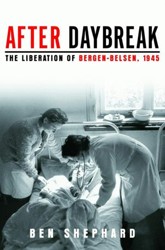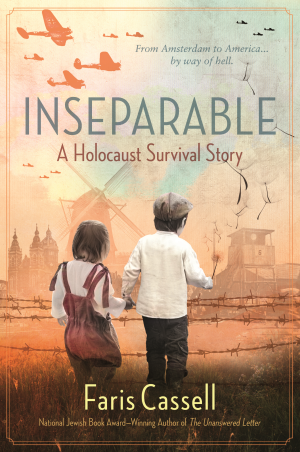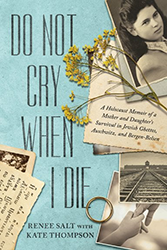Following Rachel Genuth, a poor Jewish teenager from the Hungarian provinces, and Hugh Llewelyn Glyn Hughes, a high-ranking military doctor in the British Second Army as they move across Europe in the final year of World War II, All the Horrors of War tells the powerful story of their convergence in Bergen-Belsen, where the girl fights for her life and the doctor struggles to save thousands on the brink of death. In the ensuing months, as Rachel gradually recovers and as Belsen survivors mourn grave losses and form a vibrant community, Glyn Hughes experiences a watershed: moved by the rebirth he witnesses, he becomes (against the stance of British officialdom) an advocate for survivors with whom he forges lifelong friendships. All the Horrors of War compels readers to consider the full complex humanity of both the liberator and a survivor for whom the author has special understanding: after ten years in and out of tuberculosis sanatoriums, Rachel marries another survivor, moves to the United States and becomes Ruth Mermelstein — the author’s mother.

Nonfiction
All the Horrors of War: A Jewish Girl, a British Doctor, and the Liberation of Bergen-Belsen
September 1, 2019
Discussion Questions
Questions courtesy of Bernice Lerner
- In what ways were any of your preconceived notions about World War II altered after reading All the Horrors of War?
- All the Horrors of War begins and ends with episodes from “The Belsen Trial.” What was the purpose of giving forty-five SS and guards a fair trial? Do you agree with those who thought the trial “absurd” or “a sacrilege”? Why do you think thousands of concentration camp guards got off “scot- free”?
- As Rachel’s daughter, the author had a unique perspective. In what ways did this shape — or reveal itself in — the book? How may the book have been different had it been written by someone else?
- The author describes the devastating situation in Bergen-Belsen at the time of its liberation: 10,000 unburied corpses; 55,000 war-ravaged inmates, 25,000 of whom required immediate hospitalization — of these, the British would be unable to save 14,000. How does a focus on individual lives, such as depicted in this book, help us begin to grasp the larger, unfathomable, picture?
- How does the medical rescue in Bergen-Belsen — where epidemics raged, where decisive action was critical and resources, limited — inform your understanding of medical rescue efforts in extreme situations?
- Rachel does not have a single photograph of her family or herself from before the war. Having no evidence of a previous life, she has said that she felt as if “she were born from a stone.” What is the importance of artifacts (including photos and documents) in your life?
- Rachel had important responsibilities as a child, including helping her parents and keeping the ledger for her grandmother’s butcher business. How do our childhood experiences fortify or “soften” us? What attributes were cultivated in Rachel — and what instruction did she receive — that may have helped her endure hardship?
- Why did Rachel’s birthday celebration with her kitchen co-workers in Christianstadt have such a powerful effect on her? Is the marking of events in creative ways, in “abnormal” times, especially meaningful/memorable? If yes, why is this so?
- Rachel survived with her sister Elisabeth. In what ways did they display their devotion to each other? What aspects of their sibling relationship seemed typical or unusual to you?
- Throughout her incarceration, Rachel took risks. She begged for and “stole” food, volunteered for “work,” and carried out acts of sabotage. What benefit did she derive from such acts and was it worth risking death or severe beatings in various instances? What might you have done?
- What most helped Rachel in Sweden? What impressed or saddened or surprised you about her post-war return to life?
- Glyn Hughes became an unintended “liberator.” Is he a hero? Did his intentions and/or actions at Bergen-Belsen differ from those of anyone who might have been in his position? What qualities become evident in extremity? What do you consider heroic?
- Several eyewitnesses recounted how Glyn Hughes broke down crying when he was first shown around Bergen-Belsen. What does this say about the war-hardened military officer? What does it say about the situation? Was there anything in Hughes’s past (that we know of) that might have foreshadowed his empathy for survivors? His deep feelings for the Jewish people?
- The author connects Glyn Hughes’s research on the treatment of sick and dying patients — decades after the war — to his knowledge of Bergen-Belsen, where he witnessed thousands of agonizing deaths, about which he could do nothing. Is this connection plausible? How may later pursuits redeem a past that was in some way difficult or troubled?
- Much of Lerner’s narrative is devoted to Second Army battles. What challenges and advantages did Hughes have in his role as Deputy Director of Medical Services — first of 8 Corps, then of the entire British Second Army? What impressed or surprised you most about the Allied effort? About defenders of Hitler’s murderous regime?
- Were you able to relate to any aspects of either Rachel’s or Hughes’s experiences? What anecdote about the survivor or the medical officer will you most likely remember? What lessons may their lives offer for those who will never endure or witness the horrors of war?

Jewish literature inspires, enriches, and educates the community.
Help support the Jewish Book Council.


